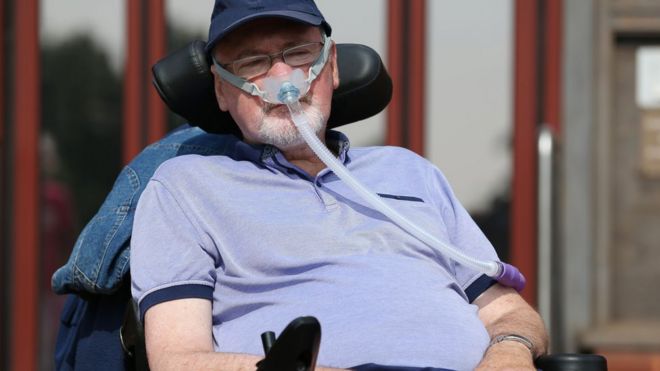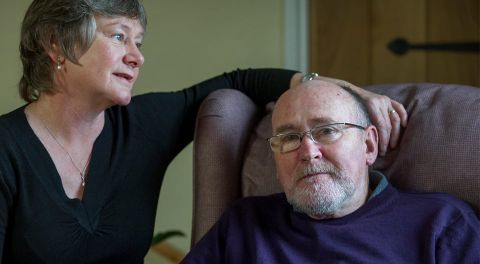 BOOK REVIEW: HARD DAYS’ JOURNEY INTO NIGHT – Memoirs of an MND warrior and human rights campaigner
BOOK REVIEW: HARD DAYS’ JOURNEY INTO NIGHT – Memoirs of an MND warrior and human rights campaigner
The subtitle of Noel Conway‘s book “Hard Days’ Journey into Night” is “Memoirs of an MND warrior and human rights campaigner”. Noel was certainly both of these, but the subtitle really does not do justice to either the book or to Noel. In fact, this book has several themes each of which would on its own make it a good read.
During a long career as a consultant clinical neurologist, I have talked to many dozens of people to explain their diagnosis of MND and I am familiar with their various outward reactions – but one is often uncertain what they are thinking. Noel describes how the neurologist, with a quiet, dignified and professional manner, confirmed to him the diagnosis of MND that Noel had already suspected. Noel sat unmoving with Carol’s hand in his, screaming inside his head “I know what I’ve got! That’s not what I want to know!” In an equally quiet and dignified voice, Noel asked the all important question “How long have I got?” So starts the story of an extraordinary journey from able-bodied to paralysed from the neck down. A journey that at various times has been a rollercoaster of emotions both highs and lows, physical challenges to be either overcome or circumvented, good friends and less good friends, and carers who cared and those that didn’t seem to; losing the ability to do some things and finding other meaningful activities to replace them.
In those early days Noel had access to all the facts and statistics about MND, but what he could not find and what he really wanted to know was how people with MND actually felt, how they lived with it, and how they coped. Even back then the seed of this book was sown – the idea of providing a narrative of a life with MND. This book provides just that – the story of Noel’s extraordinary and inspiring life with Carol by his side and a story of the people who helped him and continue to help him to lead the best life he can, people to whom he dedicates the book. For someone with MND or for members of their family, this book would be of interest and helpful for this reason alone.
But there is another major and fascinating theme to this book which is Noel’s legal challenge concerning the current law on assisted dying as set out in the 1961 Suicide Act. Noel’s account of his battles (so far – the war is not over yet by any means) is an enthralling read and he provides an excellent review of the arguments for and against a change in the law. He vividly depicts the heavy guns on either side, seen through the eyes of someone fighting for his life (and for his right to decide its end) in the front line. If the law on assisted dying does in time change (as many of us hope), it will be thanks to the hard work, courage and persistence of those like Noel. This part of the book would be a good read for anyone interested in the issues involved.
Quite apart from the fascinating accounts of Noel’s battles with MND and with the law, we also have an account of his early working class upbringing in “the grim industrial landscape of the North” and of the determination, enterprise and sheer hard work that lead eventually to a successful and well-regarded career in further education. Noel from a young age was acutely aware of the unfairness and inequality in society, but unlike so many of us who shrug and say “well what can we do?” he became socially and politically active. Noel relates the evolution of his activism in local politics, as trade union officer, in secularism to reduce undue religious influence in society, in opposition to fascism and racism, in labour party politics and more recently human rights issues, such as law change on assisted dying.
I first came to know Noel, not through any medical problem, but due to our shared interest in campaigning with Humanists UK to eliminate inappropriate religious influence in public life, be it bishops in the House of Lords or State-funded faith schools.
As if all these different lives crammed into one were not enough, Noel also describes with relish his love of the outdoors including walking, climbing, mountaineering, skiing and cycling – all of which have been progressively eliminated from his life by muscle weakness as has even his love of cooking. But the muscle that Noel still flexes with gusto and to great effect is the muscle of his fierce intellect and his passion for languages and for books and for writing. While too weak to use a keyboard, Noel has written (using voice recognition software) and published not only “Hard Days’ Journey into Night” but also “Tales from the Hill” a delightful book of short local folklore stories and a number of articles in various publications.
Throughout the book there is a clear sense of Noel’s strong personality. On one hand his kindness, his humour and his love of family and friends and on the other is his fierce determination to confront injustice and unfairness wherever he finds it. This is an inspiring book on many levels.
Dr Simon Nightingale MBBS BSc FRCP MD, Retired Consultant Neurologist

 For the Hot Potatoes open mike session on 17 January, Noel Conway wrote an update on legal action concerning a change in the law on assisted dying. Noel is unable to attend in person, so the text was read by Simon Nightingale.
For the Hot Potatoes open mike session on 17 January, Noel Conway wrote an update on legal action concerning a change in the law on assisted dying. Noel is unable to attend in person, so the text was read by Simon Nightingale.

